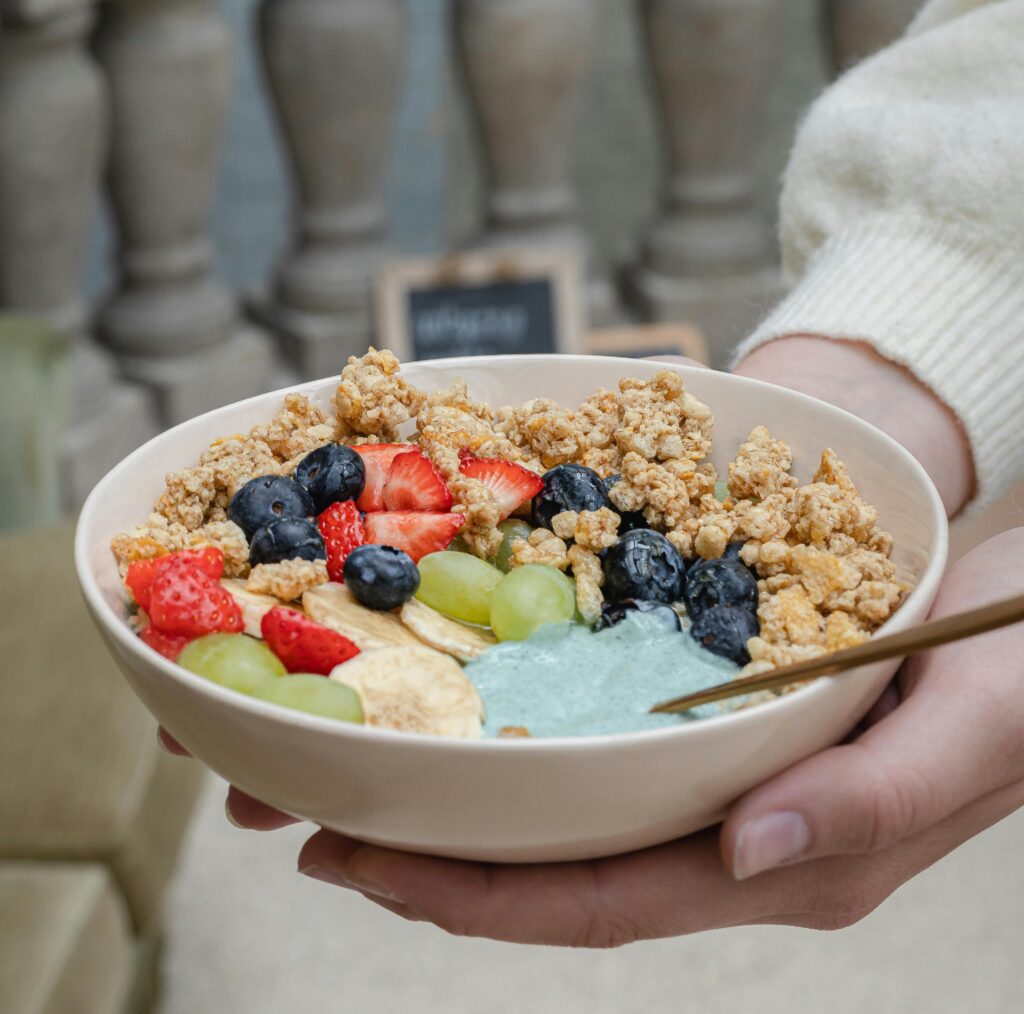As women grow older—especially beyond 35—the body begins to undergo hormonal shifts, slower metabolism, and a higher risk of chronic inflammation. This inflammation is often a silent culprit behind joint pain, fatigue, weight gain, and even conditions like diabetes or heart disease. But there’s good news: nutrition can be your best defense!
In this post, we’ll explore 7 powerhouse anti-inflammatory foods and share simple recipes you can include in your weekly meal plan to support your wellness journey.
1. Fatty Fish (Salmon, Mackerel, Sardines)

Why It’s Important:
Fatty fish are rich in omega-3 fatty acids—natural inflammation fighters that reduce pain, improve heart health, and support brain function.
Quick Recipe: Grilled Salmon with Garlic Spinach
Ingredients:
- 1 salmon fillet
- 1 tbsp olive oil
- Salt and pepper to taste
- 1 clove garlic, minced
- 1 cup fresh spinach
Instructions:
- Season the salmon with salt and pepper.
- Grill or pan-fry for 5–6 minutes per side.
- In another pan, sauté garlic in olive oil, then toss in the spinach until wilted.
- Serve together with a lemon wedge.
2. Leafy Greens (Spinach, Kale, Swiss Chard)

Why It’s Important:
Leafy greens are loaded with vitamins A, C, and K, plus antioxidants that help neutralize harmful free radicals in the body.
Quick Recipe: Green Smoothie
Ingredients:
- 1 cup spinach or kale
- 1/2 banana
- 1/2 green apple
- 1/2 cup cucumber slices
- 1 cup water or almond milk
Instructions:
Blend all ingredients until smooth. Enjoy in the morning to kick-start your day with energy.
3. Berries (Blueberries, Strawberries, Raspberries)

Why It’s Important:
These colorful fruits are rich in anthocyanins, which help lower inflammation, support immune health, and even improve skin.
Quick Recipe: Berry Breakfast Bowl
Ingredients:
- 1/2 cup Greek yogurt (or plant-based yogurt)
- 1/4 cup each of blueberries, strawberries, and raspberries
- 1 tbsp chia seeds
- 1 tbsp honey (optional)
Instructions:
Layer the yogurt and berries in a bowl. Top with chia seeds and a drizzle of honey.
4. Olive Oil
Why It’s Important:
Extra virgin olive oil is a heart-healthy fat that contains powerful anti-inflammatory compounds. It’s a great replacement for processed vegetable oils.
Quick Recipe: Lemon Olive Oil Dressing
Ingredients:
- 3 tbsp olive oil
- 1 tbsp lemon juice
- 1/2 tsp Dijon mustard
- Salt and pepper to taste
Instructions:
Whisk all ingredients together and drizzle over salads or steamed vegetables.
5. Nuts (Almonds, Walnuts)
Why It’s Important:
Nuts provide fiber, antioxidants, and good fats that lower inflammatory markers and improve brain function.
Quick Recipe: Nutty Energy Bites
Ingredients:
- 1 cup oats
- 1/4 cup ground flaxseeds
- 1/2 cup almond butter
- 1/4 cup chopped walnuts
- 2 tbsp honey
- Pinch of salt
Instructions:
Mix all ingredients in a bowl, roll into small balls, and refrigerate for 30 minutes.
6. Turmeric
Why It’s Important:
Turmeric contains curcumin, a compound well-known for its anti-inflammatory and antioxidant properties. It’s especially beneficial for joint health and hormonal balance.
Quick Recipe: Turmeric Golden Milk
Ingredients:
- 1 cup unsweetened almond milk
- 1/2 tsp turmeric
- 1/4 tsp cinnamon
- 1/4 tsp ginger powder
- 1 tsp honey
Instructions:
Warm the almond milk and whisk in all the spices. Sweeten with honey and enjoy before bedtime.
7. Green Tea
Why It’s Important:
Green tea contains catechins—natural antioxidants that reduce inflammation and protect cells from damage.
Quick Recipe: Iced Mint Green Tea
Ingredients:
- 2 green tea bags
- 2 cups boiling water
- Handful of fresh mint leaves
- Lemon slices (optional)
Instructions:
Steep the tea bags and mint in boiling water for 10 minutes. Remove bags, cool, then serve with ice and lemon slices.
Internal Resources You May Also Like:
- 10 Overlooked Superfoods That Are Incredibly Important for Your Health
- The Ultimate Guide to Healthy Eating
- Best Hormone-Balancing Foods for Women Over 40
FAQ
Q1: Can I get these anti-inflammatory benefits through supplements?
A: While supplements can help, whole foods offer a full range of nutrients that work together for better results. Always prioritize real food when possible.
Q2: Are these foods safe for everyone?
A: Yes, but always check for allergies or sensitivities, especially with nuts or dairy. Consult your healthcare provider if you have chronic conditions.
Q3: How often should I eat these foods?
A: Try to include at least 3–4 of these foods daily. Consistency is key for long-term benefits.
Q4: Can children also benefit from these foods?
A: Absolutely! These foods are family-friendly and can support children’s growth and immunity.
